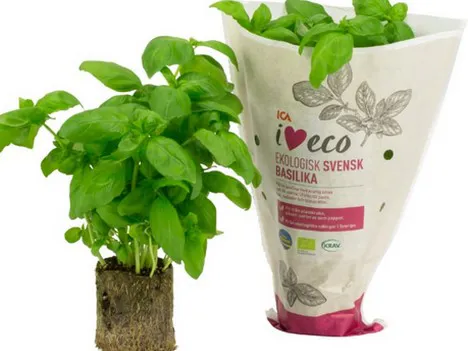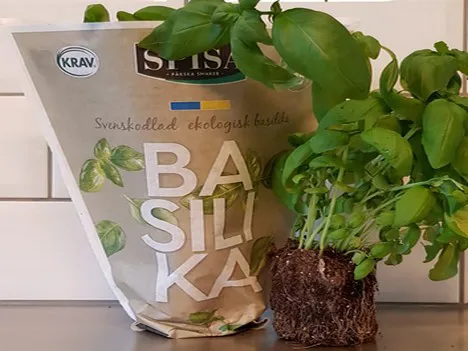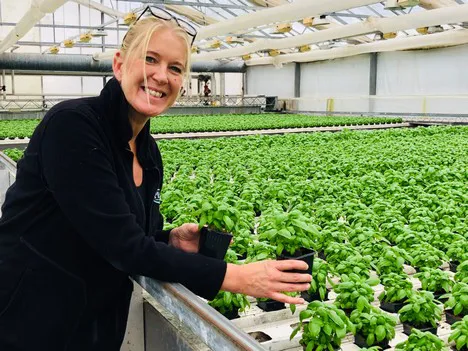On November 1st, 2019, new sustainable herb packaging was released in Swedish ICA stores. Spisa Smaker, a greenhouse herb growing company with the goal of providing locally produced herbs year-round, constructed the packaging to eliminate plastic in favor of paper in three aspects. The plants are no longer in plastic pots but rather have a tight clump of soil and roots at the bottom of the plant. The transport trays are made out of cardboard, and the sleeve is made out of 90% renewable material which can be recycled into paper.

Spisa’s director Jonna Hansson says: “The reaction to this new packaging has been really great – it really is a revolutionary packaging and the consumers recognize this and are appreciative of it. It is a completely new product and can’t be compared with other products on the market. Our biggest challenge is ensuring that the herbs are watered correctly, the soil pack needs to be as moisturized as possible. The goal is to have the product move fast enough so the stores don’t have to water it. Then, when the consumer takes the herbs home, they’re provided with watering instructions on the package. They can put the soil pack into a glass of water and this will help sustain the herbs until the consumer is ready to use them.”
She adds: “The sleeves are completely new too, and we continue to work to improve them every day. In 2020 we aim to have this packaging available for all of our herbs. We want to take responsibility in our production and we do this by cutting out plastic in favor of paper. Currently, we are collaborating with ICA on this, but we have started the dialogue with all other retailers – we aren’t there yet, but the interest is definitely there.”

Challenges in the herb production
The herb production in Sweden has been challenging the past few months due to the local climate. Hansson explains: “We have had about two days of sun in the past two months. This makes it challenging for us to light the greenhouses – it takes more energy to light them when it is so dark outside. We also see that the product is weaker when it doesn’t get natural sunlight and that the artificial lighting just isn’t the same. But the product is still at a good enough quality and we have been selling a lot for Christmas, especially dill and chives. The consumers are very happy that they are able to get the Swedish grown product year-round.”

Floods in Kenya increase demand for local products
While Spisa Smaker is able to supply locally grown herbs year-round, there are imported herbs available on the Swedish market too. With the supply issues in other origins, such as Kenya due to floods, the local production is seeing an increase in demand.
“We have definitely seen the effects of the shortages. There are spikes in demand but we would need to know at least eight weeks ahead of time if we wanted to be able to supply the increased demand. So the demand is up but we can’t sell more than what we have. But this has been the situation since week 43. The pricing remains unaffected though, because we keep our pricing stable throughout the year. We would prefer it if the consumers would switch to locally grown product year-round, rather than only when the imported product isn’t available,” Hansson concludes.
